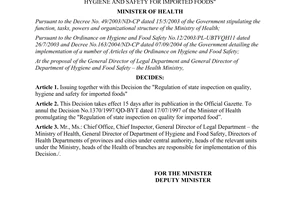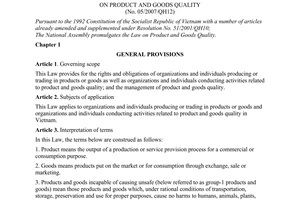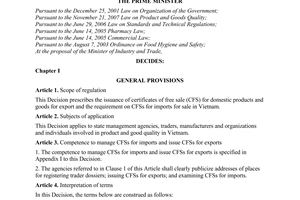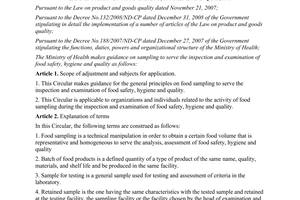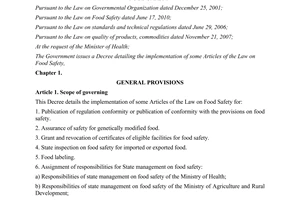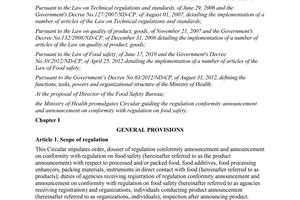Nội dung toàn văn Circular No. 52/2015/TT-BYT regulations on state inspection of imported food safety
|
THE MINISTRY OF
HEALTH |
SOCIALIST
REPUBLIC OF VIETNAM |
|
No. 52/2015/TT-BYT |
Hanoi, December 21, 2015 |
CIRCULAR
REGULATIONS ON STATE INSPECTION OF IMPORTED FOOD SAFETY, AND APPLICATIONS AND PROCEDURES FOR GRANT OF CERTIFICATE OF EXPORT TO EXPORTED FOODS UNDER THE ADMINISTRATION OF THE MINISTRY OF HEALTH
Pursuant to the Law on Food Safety dated June 17, 2010;
Pursuant to the Law on Food Safety dated June 17, 2010;
Pursuant to Decree No. 38/2012/ND-CP detailing the implementation a number of articles of the Law on Food Safety date April 25, 2012 of the Government;
Pursuant to Decree No. 63/2012/ND-CP on functions, power, responsibilities and organizational structure of the the Ministry of Health dated August 31, 2012 of the Government;
Pursuant to the Decision No. 10/2010/QD-TTg on Certificate of free sale of imports and imports dated February 10, 2010 of the Prime Minister;
At the request of the Director of Department of Food Safety
The Minister of Health issues this Circular on state inspection of safety of imported food, and application and procedures for grant of certificate of exported food safety under the administration of the Ministry Of Health
Chapter I
GENERAL PROVISIONS
Article 1. Scope
This Circular regulates:
1. Inspection of imported food under the administration of the the Ministry of Health prescribed in:
Annex No.01 of the Joint Circular No. 13/2014/TTLT-BYT-BNNPTNT-BCT guiding the assignment and cooperation in State management of food safety dated April 09, 2014 of inter-ministries including the Ministry of Health, Ministry of Agriculture And Rural Development (hereinafter referred to as the Joint Circular No. 13/2014/TTLT-BYT-BNNPTNT-BCT);
b) Clause 3, Article 14 of the Decree No. 38/2012/ND-CP detailing the implementation a number of articles of the Law on Food Safety date April 25, 2012 of the Government;
2. The application and procedure for grant/withdrawal of a certificate of free sale for an exported food under the administration of the Ministry of Health
3. The application and procedure for grant/withdrawal of a certificate of health and certificate of export for an exported food under the administration of the Ministry of Health
4. This Circular excludes exported food that are entitled to be free from inspection as regulated in Clause 2, Article 14 of the Decree No. 38/2012/ND-CP detailing the implementation a number of articles of the Law on Food Safety date April 25, 2012 of the Government;
Article 2. Interpretation of terms
For the purpose of this Circular, the terms below shall be construed as follows:
1. A food owner means a trader who is responsible for food quality presented in declarations (hereinafter referred to as the trader) or any entity that is authorized to import or export food by the aforesaid trader.
2. Articles means a group of foods that bears the same name, label and package and such packages are manufactured by the same manufacturer
3. Shipment means all articles of an imported/exported shipment (that has the same reference number of bill of lading). A shipment may contain more than one food products.
Chapter II
STATE INSPECTION OF IMPORTED FOOD
Article 3. State inspecting authorities for food safety
The State Inspecting authority of food safety (hereinafter referred to as the inspecting authority) is an authority or agency that is qualified for the food testing and inspection and appointed by the the Ministry of Health.
Article 4. Comparison of inspection results
1. Declarations of conformity or declarations of compliance with food safety regulations.
2. Regulations, national technical regulations of Vietnam and international on food safety, quality and labeling.
Article 5. Methods of inspection
1. Standard inspection is the inspection of the application and representative sample by which food labels, packages and special preservation (if any) are organoleptically examined.
If any organoleptic indicator of packages or special preservation (if any) of inspected foods is suspected, the inspecting authority shall determine the group and testing indicators for the inspected article based on its ingredients, the history of the product quality, the history of owner’s importation, the origin of such product and its quality control system.
2. Strict inspection applies to the following cases:
a) Where the article fails to pass the previous inspection, such product shall undergo a documentary inspection and shall be sampled for testing of indicators presented in its declarations;
b) Where the Ministry of Health or overseas competent authority or the manufacturer issues warnings against the article, such product shall undergo a standard inspection and testing for warned indicators, or where the results of warned indicator inspection is required to be issued by inspecting agencies that is recognized by the State competent authority of the exporting country.
3. A reduced inspection means documentary inspection only.
Reduced inspection shall apply to an article within 12 months from the date of application.
Article 6. Application of inspection
1. The standard inspection applies to all articles of an imported shipment, except for cases regulated in clause 2 and clause 3 of this Article.
2. A reduced inspection is granted to articles regulated in point a, b or c of this clause as follows:
a) Any article that is certified as satisfactory for food safety requirements by competent authorities of the signatories of the international agreement on mutual recognition of food safety inspection and quality to which Vietnam is a signatory; a article that is certified as conformable with Vietnam’s regulations by the competent authorities of the exporting country;
b) Articles that meet the import requirements in 03 consecutive standard inspections conducted on different days within 12 months (if any)
c) Articles having undergone a reduced inspection in 12 months that satisfy requirements of periodic inspections under regulations in clause 1, Article 13 of the Circular No. 19/2012/TT-BYT guiding the declaration of conformity and declaration of compliance with food safety regulations dated November 09, 2012 of the Minister of Health,;
d) Reduced inspection shall only apply when it is granted by the Department of Food Safety -Ministry of Health on the basis of fulfillment of requirements in point a, b and c, clause 2 of this Article.
The trader who wishes to be granted a reduced inspection shall submit an application for reduced inspection of imported food according to the Annex 1A enclosed with this Circular. Within 05 working days from the date of receipt of the application, the Department of Food Safety –Ministry of Health shall send a written notice of whether granting reduced inspection to the applicant using the form in Annex 1B enclosed with this Circular.
3. The strict inspection applies to imported articles regulated in the following cases:
a) Any article that fails to satisfy import requirements of the previous inspection;
b) Any article of which the Ministry of Health or overseas competent authorities or its manufacturer gives warning signs.
4. Switchover from strict inspection to standard inspection:
a) Where an article passes 02 consecutive strict inspections, its next import shall be eligible for standard inspection as regulated in clause 1 of this Article;
b) Where the Department of Food Safety – Ministry of Health releases a document about cancelation of strict inspection of the article of which the Ministry of Health or overseas competent authorities or its manufacturer gives warnings.
Article 7. Applications for inspection
1. An application for imported food inspection using the form in the Annex 02 of this Circular.
2. A certified true copy of the declaration of conformity or declaration of compliance to food safety regulations, or a copy of such declaration that is sealed by the trader enclosed with the original.
3. A decision on grant of reduced inspection (if any) issued by the Department of Food Safety –Ministry of Health.
4. The Power of Attorney of the trader granted to entities that are authorized to import or export food (if any).
5. A copy of the packing list
6. Certified true copies of the bills of lading and invoices signed and sealed by the trader.
Article 8. Procedures for inspection
1. The trader shall submit an application for inspection at the inspecting authority or via the portal of National Single Window System before or at the time his/her article reaches the checkpoint.
2. Within 01 working day from the date of receipt of the application, the inspecting authority shall examine the application;
a) In case of a complete and valid application under Article 7 of this Circular, the shipment shall be inspected as regulated in clause 3 or clause 4 of this Article;
b) In case of an incomplete application under Article 7 of this Circular, the inspecting authority shall return such application enclosed with a notice of missing or unconformable documents to the applicant.
3. Inspection of a shipment or
article that is eligible for the reduced inspection:
Within 02 working days from the date of receipt of the application, the
inspecting authority shall send the applicant a notice of whether such shipment
satisfies the import requirements using the form in the Annex 03 of this
Circular.
4. The strict inspection and standard inspection of shipments or articles shall comply with the following procedures:
a) Within 02 working days from the date of receipt of the application, the inspecting authority shall take samples from the shipment that reaches the checkpoint at the the time its trader applies for inspection.
If the shipment has not reached the checkpoint at the time of application for inspection, the inspecting authority shall take samples from such shipment within 02 working days from the date of receipt of the written notice of arrival from the trader;
b) With regard to articles under strict inspection and those under standard inspection, within 06 working days and 08 working days, respectively, the inspecting authority shall:
- The inspection shall comply with the technical regulations of Vietnam or international on food safety, quality and food labeling and shall be conducted according to the declaration of conformity or the declaration of compliance with food safety regulations;
- The inspecting authority shall issue of notice of whether such shipment satisfies the import requirements using the form in the Annex 03 of this Circular.
5. With regard to any shipment that fails to satisfies the import requirements, the inspecting authority shall propose action against such shipment on the notice of unsatisfactory shipment according to clause 3, Article 55 of the law on food safety, and send such notice to the trader, and transfer all files of such shipment to the Department of Food Safety - Ministry of Health, thereafter.
6. With 05 working days from the date of receipt of the notice of unsatisfactory shipment, the trader may request the inspecting authority to reconsider the inspection results and remedies to his/her unsatisfactory shipment or to re-inspect such shipment.
7. With 05 working days from the date of receipt of the proposed remedies against the unsatisfactory shipment and the files of such shipment from the inspecting authority, the Department of Food Safety –Ministry of Health shall make a decision on the remedies to unsatisfactory shipment.
Article 9. Report on results of remedies to unsatisfactory shipments
1. After the action against the unsatisfactory shipment is taken, the trader submits one of the following documents to the inspecting authority:
a)A certificate of re-export (for those serving the purpose of re-export)
b) A copy of contract between the trader and the agency taking charge of destroying such shipment, and a record of destruction verification of the environmental management authority or the Inspectorate of the Department of Health where such shipment is destroyed;
c) A contract of repurposing signed between the trader and purchaser or the transfer agreement enclosed with invoices or certificates of transfer. The purchaser or transferee of the unsatisfactory shipment must not use such shipment as food, except for those regulated in clause 2 of this Article;
d) A report on the remedial measures and location where defective products and incorrect labels are remedied.
2. If the trader wishes to import articles whose defects have been remedied to Vietnam, the trader shall apply for inspection under regulations in Article 8 of this circular.
If the shipment still fails to satisfy the import requirements, such shipment shall not be eligible for the second remedy and shall be subject to one of the remedies regulated in point d, c, and d of clause 3 of d 55 of the law on food safety.
Chapter III
APPLICATIONS AND PROCEDURES FOR GRANT AND WITHDRAWAL OF CERTIFICATE OF FREE SALE, CERTIFICATE OF EXPORTATION
Article 10. Exported articles eligible for Certificate of Free Sale, Certificate of Exportation
1. A Certificate of Free Sale (CFS) is granted to exported articles metioned in the Annex 01 of the Joint Circular No. 13/2014/TTLT-BYT-BNNPTNT-BCT.
2. The Certificate of Exportation (CE) or Certificate of declaration of compliance with food safety regulations, if required by the importing country.
Article 11. Applications for CFS/ CE
An application for CFS/CE of an article includes:
1. An application for CFS/CE using the form in Annex 04 of this Circular.
2. A certified true copy of the certificate of declaration of conformity or the certificate of declaration of compliance with food safety regulations.
Article 12. Powers and procedures for grant of CFS/CE
1. Food traders and businesses (hereinafter referred to as food entities) shall submit an application for CFS/CE to the Department of Food Safety –Ministry of Health directly or by post.
2. After receipt of the application for CFS/CE, the document processing team shall examine such application, put it into the reception book and an grant the applicant with a note of application receipt using the form in the Annex 05 of this Circular.
3. Within 05 working days from the day stated on the note of application receipt, the State competent authority in the clause 1 of this Article shall grant such entity with CFS/CH using the forms in Annex 06 and 07 enclosed with this Circular or using forms required by the importing country. In the case of rejection, the State competent authority shall send the applicant an explanation on which reasons for rejection shall be specified.
4. CFS/CE has its effective date of 02 years and its effective date shall not exceed the effective date of the Certificate of Declaration of Conformity or the Certificate of declaration of compliance with food safety regulations.
Article 13. Cases of withdrawal of CFS/CE
1. Applicants falsify documents in application for CFS/CE.
2. CFS/CE is granted to an article that is unconformable with applicable technical standard or regulations.
3. The certificate of declaration of conformity or the certificate of declaration of compliance with food safety regulations of the article is revoked.
4. CFS/CE is granted ultra-vires.
Article 14. Procedures for withdrawal of CFS/CE
1. The State authority competent to grant CFS/CE shall issue a written notice of CFS/CE withdrawal and send it to the food entity that is granted CFS/CE.
2. Within 05 working days from the date of receipt of such notice of the State competent authority, the food entity that is granted CFS/CE shall return such certificate to the State competent authority.
3. In case of non-return of CFS/CE, the State authority competent to grant CFS/CE shall publicize an announcement that such CFS/CE mentioned in clause 1 of this Article is no longer valid and submit it to the customs authority.
Chapter IV
APPLICATIONS AND PROCEDURES FOR GRANT AND WITHDRAWAL OF HEALTH CERTIFICATE OF EXPORTED FOOD PRODUCTS
Article 15. Exported articles eligible for Health Certificates
The Health certificate (HC) is granted to a food entity for food, food additives, food substances; instruments and materials for wrapping and storing food in case that such entity applies for.
Article 16. Applications for HC
An application for HC of 01 exported shipment includes:
1. The application for HC using the form in Annex 08 of this Circular.
2. The original or certified true copy of inspection results of every article of the exported shipment, comprising indicators required in respective technical regulations ( for those whose technical regulations are available) or key quality norms , safety norms under provisions (for those whose technical regulation are not available), name of product, the lot number, date of production and expiry date that are recognized by the appointed inspecting authority or the accredited independent inspecting authority or recognized inspecting authority.
3. Samples of product labels (duplicates certified by the food entity).
4. Duplicates of the Certificate of Business Registration, Certificates of Fulfillment of Food Safety Conditions (except for food entities regulated in clause 1, Article 12 of the Decree No. 38/2012/ND-CP detailing the implementation of a number articles of the Law on food safety dated April 25, 2012 of the Government) or the Certificate of declaration of conformity or the certificate of declaration of compliance with food safety regulations, signed and sealed by the food entity.
Article 17. Power and procedures for grant of HC
1. Food entities that wish to be granted a HC shall submit an application for CFS/CE to the Department of Food Safety – Ministry of Health directly or by post.
2. After receipt of the application for CFS/CE, the document processing team shall examine such application, put it into the reception book and an grant the applicant with a note of application receipt using the form in the Annex 05 of this Circular.
3. Within 05 working days from the day stated on the note of application receipt, the State competent authority in the clause 1 of this Article shall consider granting such entity with a HC using the forms in Annex 09 and 10 enclosed with this Circular In the case of rejection, the State competent authority shall send the applicant an explanation on which reasons for rejection shall be specified.
Article 18. Cases of withdrawal of HC
1. Applicants falsify documents in the application for HC.
2. HC is granted to an exported shipment whose products are unconformable with applicable technical standard or regulations (if any).
3. The Certificate of Declaration of Conformity or the Certificate of declaration of compliance with food safety regulations of the article is revoked (if any).
4. HC is granted ultra-vires.
Article 19. Procedures for withdrawal of HC
1. The State authority competent to grant HC shall issue a written notice of HC withdrawal and send it to food entities that are granted HC.
2. Within 05 working days from the date of receipt of such notice of the State competent authority, the food entity that is granted HC shall return such certificate to the State competent authority.
3. In case of non-return of HC, the State authority competent to grant HC shall publicize an announcement that HC mentioned in clause 1 of this Article is no longer valid on its portal and submit it to the customs authority.
Chapter V
RIGHTS AND RESPONSIBILITIES OF AUTHORITIES, ORGANIZATIONS AND INDIVIDUALS
Article 20. Rights and responsibilities of traders
The trader shall have rights and responsibilities as follows:
1. Request to be granted reduced inspection of imported products regulated in point a/b/c, clause 2, article 6 of this Circular.
2. Request the inspecting authority to reconsider the inspection results or request the Department of Food Safety –Ministry of Health to have an appointed testing authority re-inspect the articles within 5 working days from the day receiving the notice of unsatisfactory shipments.
a) Request the inspecting authority that carries out the first inspection to claim expenses if its result is different from that of the re-inspection;
b) Pay all costs of the re-inspection if its result is consistent with that of the first inspection;
3. Propose, in writing, one of the remedies to his/her unsatisfactory shipment or product that stated in the notice in Annex 03 of this Circular.
4. Maintain the status quo of seal that the customs authority has set on the unsatisfactory shipment or food product.
5. Follow penalties for unsatisfactory shipment or articles imposed by the State competent authorities;
Article 21. Rights and responsibilities of inspecting authorities
1. Have access to the store and food transport container to inspect and take samples. Samples shall be taken in accordance with the Circular No. 14/2011/TT-BYT guiding food sampling for inspection of food quality and hygiene dated April 01, 2011 of the Minister of Health.
2. Exercise food inspection in accordance with regulations in this Circular.
3. Collect inspection fees and charges under regulations of laws.
4. Store samples in a duration regulated in testing method standards or similar documents. At the end of the regulated duration of sample storage, the inspecting authority shall require the trader to get his/her samples back or shall make a record of sample clearance.
5. Ensure the profession, accuracy, honesty and objectivity during the inspection of imported shipment.
6. Be subject to the direction, guidance and inspection by the Department of Food Safety - Ministry of Health in the respective field under the administration of the Ministry of Health.
7. Receive and deal with the trader’s complaints. Take responsibilities for mistakes occurring during the inspection. If the customs authority’s mistakes cause any damage to the trader, the inspecting authority must pay for the whole testing and inspection fees and and compensate for such damage under the regulations of laws.
8. Store inspection records under laws and present such records if requested by the competent authority
9. Submit a monthly report to the Department of Food Safety –Ministry of Health using the form in the Annex 11 of this Circular after 10 working days from the reported month ended.
10. Suspend the inspecting authority from inspection of food safety under the administration of the Ministry of Health if this inspection authority fails to submit its monthly report in 03 consecutive months.
Article 22. Rights and responsibilities of the Department of Food Safety –Ministry of Health
1. Publish warnings and the effect of such warnings of the Ministry of Health or overseas competent authorities or food manufacturers on the portal of the Department of Food Safety.
2. Consider granting the trader with the permission for taking responsibility for quality of articles presented in the declarations that are eligible for reduced inspection in the regulated time
3. Decide and instruct the implementation of remedial measures against imported shipments that fail to satisfy food safety requirements.
4. Deal with complaints of traders and inspecting authorities, and propose actions against violations to the competent authority
5. The Department of Food Safety shall submit an annual report on State inspection of imported food and a proposal for management strategies in each period.
Chapter VI
IMPLEMENTATION
Article 23. Entry into force
1. This Circular comes into effect from February 23, 2016.
2. In case any legal normative documents referred to this Circular is amended or replaced, the new one shall prevail.
3. The Decision No. 23/2007/QD-BYT on State inspection of imported food safety shall be null and void from the day on which this Circular takes effect.
4. Any issues or concerns arising during the implementation of this Circular shall be promptly reported to the Department of Health - Ministry of Health.
|
|
ON BEHALF OF THE
MINISTER |
------------------------------------------------------------------------------------------------------
This translation is made by LawSoft and
for reference purposes only. Its copyright is owned by LawSoft
and protected under Clause 2, Article 14 of the Law on Intellectual Property.Your comments are always welcomed
